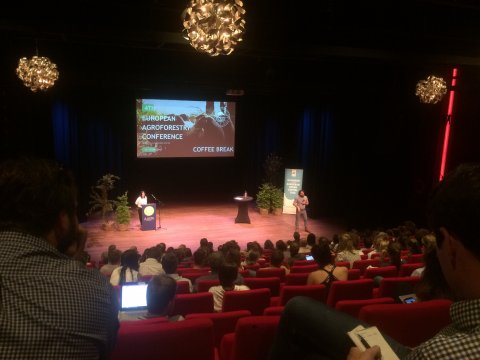The 4th European Agroforestry Conference “Agroforestry as Sustainable Land Use” took place in Nijmegen (European Green Capital 2018), The Netherlands, between 28th and 30th May 2018. The conference brought together over 250 people from the five continents.
The opening of the conference was carried out by María Rosa Mosquera-Losada, President of EURAF and coordinator of the AFINET project, with a presentation entitled “We have a dream: fostering agricultural transition towards agroforestry” highlighting the benefits of agroforestry, the needs of innovation for a farmer transition and providing key messages about current mistakes done by policy makers when agroforestry is considered.
The first day of the conference, several scientific sessions took place: “Factors of success and failure in the transition into agroforestry", "Costs and revenues of agroforestry on the scale of the individual farm, a region and a state; proven practice and theoretical models", "Agroforestry policies" and "Agroforestry as a form of sustainable land use to fight against climate change". The second day, the participants in the conference enjoyed the most relevant agroforestry innovations in the Netherlands in the visited. The last day of the conference, five scientific sessions were carried out in the morning: "Testimonies of farmers from Europe", "Environmental benefits of agroforestry", "Biodiversity and added value", "Tree fodder: food for thoughts?" and "Innovations in agroforestry" and five more scientific sessions in the afternoon: "Social and economic aspects in developing agroforestry", "Tree-Crop-Animal competition and facilitation", "Agroforestry and multiple products value chain”, "Education and tools to investigate agroforestry" and "Dutch practice and Dutch transition".
Over all, the Nijmegen agroforestry statement was delivered based on a bottom up approach excellently conducted by Louis Dolmans with the help of Jan Willem Erisman and María Rosa Mosquera-Losada who presented and give it to the Vice Major of the Nijmegen city.
María Rosa Mosquera-Losada presented the AFINET project to the audience in the session “Innovations in agroforestry”. In her presentation, María Rosa Mosquera-Losada explained that AFINET is one of the seventeen thematic networks that the European Union has financed under the H2020 framework to foster innovation in Europe. The main topic of AFINET is agroforestry, a practice of deliberately integrating woody vegetation with crops and/or animal products.
AFINET follows a multi-actor approach linked to the nine Regional Innovations Networks (RAINs) created to identify main challenges and develop main innovations about agroforestry. The main challenges identified are related to technical, economic, communication and policy issues. Other partners of the AFINET project also presented the activities carried out in the RAINs meetings organized in their countries. Andrea Pisanelli (CNR, Italy), Michael den Herder (EFI, Finland) and Robert Borek (State Research Institute, Poland) presented the works entitled “Agroforestry systems and innovation in extra-virgin olive oil chain in Central Italy”, “Opportunities for agroforestry in Finland” and “Identifying bottlenecks and gateways for agroforestry development in Poland”, respectively that make the audience enjoying the current advance of agroforestry innovation thanks to AFINET.












